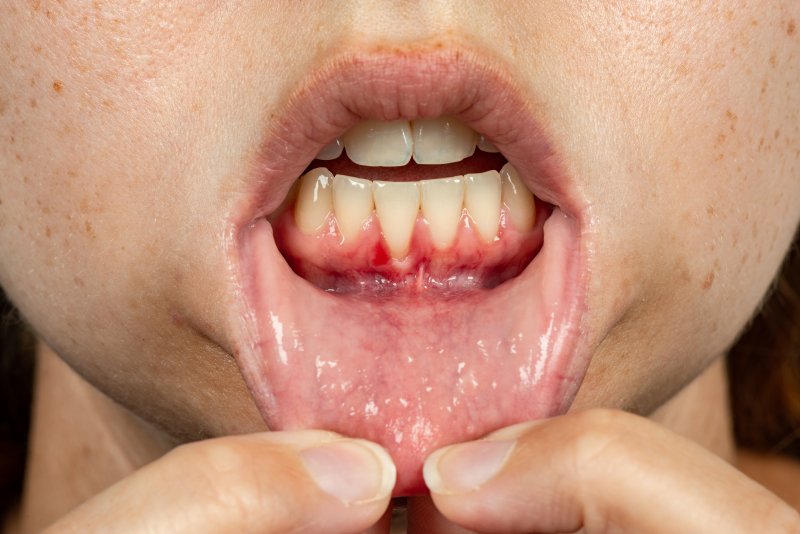What’s the Different Between Gingivitis and Periodontitis?
May 2, 2021

You have likely heard the terms “gingivitis” and “periodontitis” when discussing gum health, but what exactly is the difference between the two diseases? Are they related in any way? Which one is worse? Are they reversible in any way? Read on to learn more from your dentist about gum disease, what causes it to occur, and what you can do to prevent and eliminate it before becoming serious.
What’s the Cause of Gingivitis?
Gingivitis is a term that is used to describe a mild form of gum disease that is very common. Symptoms include inflammation, redness, irritation, and bleeding when brushing and flossing your teeth. This condition isn’t necessarily painful and often goes unnoticed.
What Is Periodontitis?
When gingivitis is left untreated and progresses, it can eventually turn into periodontitis which is a much more serious form of periodontal disease. This is defined as a serious gum infection that damages the soft tissues in your mouth. Without treatment, this condition can destroy the bone that supports your teeth and lead to loose teeth or tooth loss. Bone loss cannot be recovered. Other symptoms include bad breath, pus between your teeth and gums, gum recession, and pain while chewing.
What Causes Gum Disease?
In most cases, gum disease is caused by excessive plaque being left behind on the teeth. Eventually, if it isn’t cleaned away, it will turn to tartar which is difficult to remove and full of bacteria. The longer it sits on your teeth, the more damage it will cause. If you don’t have the tartar removed by your dentist, you are likely to develop gingivitis. When it isn’t treated, it will eventually become periodontitis. Here are some factors that can increase your likelihood of developing gum disease:
- Using tobacco products
- Hormonal changes, such as pregnancy or menopause
- Obesity
- Poor nutrition
- Conditions that decrease immunity like HIV and leukemia
- Diabetes
- Genetics
- Medications that cause dry mouth
How Can Gum Disease Be Prevented?
Here are a few tips to help you prevent the development and progression of gum disease:
- Brush: Brush your teeth twice daily to remove food particles and plaque.
- Floss: You should use dental floss to clear away food particles, plaque, and bacteria from between the teeth and beneath the gumline.
- Mouthwash: Rinsing with mouthwash helps to reduce plaque and wash away lingering food particles in the mouth after brushing and flossing.
- Don’t smoke: Smoking doubles your risk of developing gum disease. It is also linked to oral cancer among many other medical issues. Talk to your doctor, friends, and family about the best ways for you to quit for good.
- See your dentist: If gum disease is discovered early on, steps can be taken to reverse it with gum disease therapy before it becomes too serious. You should see your dentist every six months for a regular checkup.
Periodontal disease is very common, but easily preventable. Fortunately, by following the tips listed above, you can keep your gums healthy!
About the Author
Dr. J. Lee Pettigrew is an experienced dentist who has been working in the field for over three decades. He earned his dental doctorate from the University of Texas Health Science Center at San Antonio and completes over 100 hours of postgraduate courses each year. Currently, he is a proud member of numerous professional organizations, including the American Dental Association, Southwest Dental Association, and Texas Dental Association. For more information or to schedule an appointment at his office in Southlake, visit his website or call (817) 481-4888.
No Comments
No comments yet.
RSS feed for comments on this post.
Sorry, the comment form is closed at this time.
